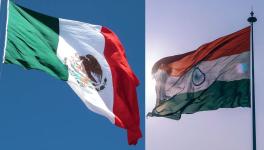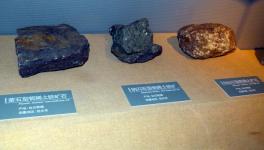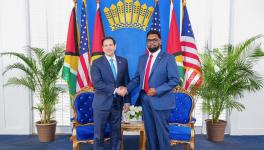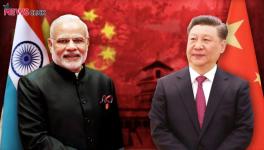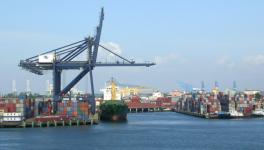Banks Are "Where the Money Is" In The Drug War
Big Lenders Face Few Hard Consequences for Violating Anti-Money Laundering Laws
Citigroup, JP Morgan Chase & Co., Wachovia (acquired by Wells Fargo in 2009), HSBC Holdings, ING Bank, Standard Chartered, American Express Bank International, and not a few others, have a common bond beyond ranking among the largest banks in the world.
All have been accused within the past five years (and several this year) of failing to comply with US anti-money laundering laws — thereby enabling, collectively, hundreds of billions of dollars worth of suspicious transactions to move through the banking system absent adequate monitoring or oversight.
Yet not one these banks, nor any of their top executives, has been hit with criminal sanctions.
All, with the exception of Britain’s HSBC (which is still under investigation), have agreed to pay fines for their alleged transgressions after being served cease-and-desist orders or have entered into so-called deferred-prosecution pacts — under which a lender agrees to pay a fine and to comply with the law going foward in exchange for dismissal of all charges at the end of a specified government monitoring period.
But again, not one bank has been charged with a crime nor have any top executives been forced to do the perp walk, bound by handcuffs, in front of the adoring media throng.
Imagine if you or I were pulled over by the cops while transporting in the trunk of our car even $10,000 in bills that traced back to individuals suspected of being involved in illegal activities, such as narco-trafficking. What are the odds that we would walk away with only a traffic ticket?
That’s essentially what is happening in these cases involving big banks, who, for all practical purposes, are allowing their money transportation systems to be rented, for a fee, by criminals, while the banks’ leadership pleads ignorance: “I didn’t know that money was in the trunk. I’ll have to look into that.”
Now, if you take that same $10,000, or even millions of dollars, and put it inside an armored car under contract to a big bank, suddenly the dirty money gains the presumption of legitimate commerce, and is likely to have a police escort as opposed to being subjected to a police inspection.
“All financial crime has a money laundering component,” says Charles A. Intriago, president of the Miami-based Association of Certified Financial Crime Specialists. “… If you’re an individual, and get caught, you get hammered.
“But if you’re a big bank, and you’re caught moving money for a terrorist or drug dealer, you don’t have to worry. You just fork over a monetary penalty, and then raise your fees to make up for it.
“Until we see bankers walking off in handcuffs to face charges in these cases, nothing is going to change,” Intriago adds. “These monetary penalties are just a cost of doing business to them, like paying for a new corporate jet.”
Broken System
The world’s financial system is incredibly complex and capable of moving trillions of dollars in many directions, across multiple borders, with the push of a button in our digital age, making it difficult for banks to truly know their customers in all cases.
Still, the law demands that they do just that, and have systems in place to assure against money laundering.
From the regulators’ perspective, suspecting that a transaction is dirty is not the same as proving it is so. Financial crimes, by design, are hard to track and involve a considerable expenditure of law enforcement resources to investigate and litigate.
Bryan Hubbard, a spokesman for the US Office of the Comptroller of the Currency (OCC), which regulates national banks, when interviewed by Narco News, stressed that his office is charged with enforcing a wide range of legal and regulatory matters, and has a number of enforcement actions underway at any given time, but it does not have a “special focus” on money laundering — though, he adds, the OCC is committed to enforcing anti-money laundering laws.
Given the reality of scarce resources, anti-money laundering laws depend, in large measure, on having the banks police themselves — by assuring that suspicious activity reports are filed with regulators when transactions exceed certain monetary thresholds or don’t pass the smell test, or that compliance departments are well-staffed and on top of their systems.
The problem, however, is that there are many holes in that system, due, in large measure, to lax enforcement by overworked or even incompetent regulators — with the added problem that some of those regulators see the lenders they regulate as potential future employers.
For example, there’s the case of HSBC (the subject of a recent US Senate investigation focused on suspected money-laundering activities). One of the former chief compliance officers for the lender's US subsidiary (called HBUS) served previously as a bank examiner for the OCC, US Senate records show. In addition, two of HBUS’ past Anti-Money Laundering directors worked previously for the US government — one as a federal prosecutor and the other as a US Treasury official.
And, in equal measure, similar power-relationship problems exist within bank compliance departments, whose employees can put at risk millions of dollars in revenue if they aggressively pursue money-laundering suspicions — with another downside being that if they are wrong, they risk angering powerful bank customers as well as their bosses.
It is that cycle of disincentives that makes it far easier for crooks to get in the door in the first place, because the risk of a bank getting caught violating anti-money laundering laws simply doesn't seem to outweigh the benefits of looking the other way.
This past August, Standard Chartered agreed to pay a $340 million fine to get a New York bank regulator off its back after the British lender was accused of illegally concealing billions of dollars worth of transactions related to Iranian interests, in violation of US laws.
“That fine of $340 million represented only 4.5 percent of Standard Chartered’s profits in 2011,” Intriago points out. “It’s chump change to the bank.”
Repeating History
But Standard Chartered isn’t alone in standing accused of using the US banking system to move money for shady characters. In the 1990s, Raul Salinas de Gortari, the brother of former Mexican President Carlos Salinas, tapped US-based Citibank to help transfer up to $100 million out of Mexico and into Swiss bank accounts. Although US authorities investigated the suspicious money movements, ultimately no charges were brought against Raul Salinas or Citibank — a Citigroup Inc. subsidiary.
Again, in January 2010, Citigroup popped up on banking regulators’ radar, this time in Mexico, when a Mexican judge accused a half dozen casa de cambios (money transmitters) of laundering drug funds through various banks, including Citigroup’s Mexican subsidiary. In that case, Citigroup again was not accused of violating any laws.
However, in April of this year, a US bank regulator, the OCC, issued a cease-and-desist order against Citigroup due to the lender’s “internal control weaknesses, including the incomplete identification of high-risk customers in multiple areas of the bank.”
Again, Citigroup was not charged with any criminal violations and also did not admit or deny any wrongdoing, but promised to institute reforms.
Narco News is well aware of Citigroup’s banking history, particularly in Mexico.
Narco News publisher Al Giordano and Mexican journalist Mario Menendez, publisher of the Mexican daily Por Esto!, stood as defendants in libel litigation filed in 2000 against them by the powerful lender Banco Nacional de Mexico S.A.(Banamex). At the time, Banamex was controlled by banker Roberto Hernandez Ramirez.
At the heart of the litigation, filed in New York state court, was the following claim, spelled out in a Dec. 5, 2001, New York Supreme Court ruling that dismissed the case against Giordano and Menendez in a major victory for Internet publications’ First Amendment rights:
“Plaintiff [Banamex] alleges that defendants [Giordano and Menendez] made accusations that Mr. Hernandez Ramirez is involved in criminal drug trafficking and specifically, the Colombian drug trade.”
While the litigation against Giordano and Menedez was still underway, Citigroup struck a deal, announced in May 2001, to acquire Banamex, then Mexico’s second largest bank, for some $12.5 billion in cash and stock.
Front Page
In recent months, money laundering in the banking system has again been making front-page news due to the case of HSBC, which found itself in the spotlight of a US Senate investigative report released this past July.
The British lender was singled out for special focus in the wake of an OCC cease-and-desist order issued against it in October 2010, which cited the lender for “critical deficiencies” in its anti-money laundering “compliance program.” The bank subsquently became the subject of a US Justice Department probe and has set aside some $1.5 billion to cover potential fines and costs related to settling the case, which, if history is any a guide, likely will result in a deferred prosecution agreement — unless Intriago’s advice is heeded and criminal sanctions are pursued to their just end.
Keep in mind that though $1.5 billion may seem like a lot of money to regular folks, HSBC has assets exceeding $2.5 trillion and posted profits of nearly $22 billion in 2011.
HSBC’s track record, as exposed so far in the case, ain’t pretty.
From the US Senate report, prepared by the Committee on Homeland Security and Governmental Affairs and released July 17:
The identified problems [at HSBC] included a once massive backlog of over 17,000 alerts identifying possible suspicious activity that had yet to be reviewed; ineffective methods for identifying suspicious activity; a failure to file timely Suspicious Activity Reports with U.S. law enforcement; a failure to conduct any due diligence to assess the risks of HSBC affiliates before opening correspondent accounts for them; a 3-year failure by HBUS [the bank’s US subsidiary], from mid-2006 to mid- 2009, to conduct any AML [anti-money laundering] monitoring of $15 billion in bulk cash transactions with those same HSBC affiliates, despite the risks associated with large cash transactions; poor procedures for assigning country and client risk ratings; a failure to monitor $60 trillion in annual wire transfer activity by customers domiciled in countries rated by HBUS as lower risk; inadequate and unqualified AML staffing; inadequate AML resources; and AML leadership problems.
Since many of these criticisms targeted severe, widespread, and longstanding AML deficiencies, they also raised questions about how the problems had been allowed to accumulate and why the [US bank regulator] OCC had not compelled corrective action earlier [prior to October 2010].
And HSBC’s Mexican and US subsidiaries, HBMX and HBUS, respectively, figure prominently in the financial carnage.
More from the Senate report:
HBMX used its banknotes account primarily to sell U.S. dollars received from its customers [in Mexico] to HBUS, which HBMX typically transported to HBUS via armored car or aircraft. In one three-month period from November 2006 to February 2007, HBMX shipped nearly $742 million in U.S. dollars to HBUS; at its peak, HBMX exported $4 billion in bulk cash shipments to HBUS over the course of one year, 2008.
The Puebla Connection
One of the mutual clients of both HBUS and HBMX is particularly problematic: a Mexican casa de cambio (or money exchange house) called Casa de Cambio Puebla.
Puebla, which operated as a money laundering arm of the Sinaloa narco-trafficking organization, also dragged another lender into its mechanizations, US-based Wachovia, which has since been acquired by US banking giant Wells Fargo.
The Senate report offers this insight into Puebla and HSBC’s subsidiaries:
In 2008, the United States indicted Puebla, two of its officers, and two other individuals on drug smuggling and money laundering charges.…
In addition, in 2010, Wachovia Bank entered into a deferred prosecution agreement with the U.S. Department of Justice for having failed to maintain an effective anti-money laundering program in connection with its casa de cambio business, including with respect to Puebla. Those legal proceedings, which involved a major Mexican CDC [casa de cambio] and major U.S. bank, received widespread attention.
Puebla was a longtime customer of HBMX. …In 2004, Puebla also opened a U.S. banknotes account with HBUS [in the US]. By 2007, Puebla had several accounts at HBMX, as well as an outstanding loan. After the United States seized the company’s [Puebla’s] funds at Wachovia Bank in May 2007, HBUS [in the US] suspended the Puebla account two weeks later and closed the account in June 2007. [However,] HBMX [in Mexico] did not actually close the account until November 2007, and then only after the Mexican Attorney General served an order on the bank seizing Puebla funds.
But the connections between Wachovia, the HSBC subsidiaries and Puebla, run far deeper.
To understand the threads that connect these financial players, it is necessary to revisit the mysterious crash of a Gulfstream II corporate jet on Sept. 24, 2007, in Mexico’s Yucatan region. Onboard that jet was an estimated four tons of cocaine, which appears to have been loaded onto the jet in Colombia.
The Gulfstream II sported a tail number, N987SA, linked by European investigators to past CIA rendition operations.
Narco News has previously reported that the bill of sale for the Gulfstream jet — which was sold only weeks before its crash landing — lists an individual named Greg Smith, whose name also shows up in public documents that indicate he worked as a pilot in the past for an covert operations involving the FBI, DEA and CIA that targeted narco-traffickers in Colombia.
A CIA asset named Baruch Vega, who was a key player in those undercover operations, also confirmed the information related to Smith. Narco News has, to date, not been able to track down Smith, or his partner in the jet-acquisition deal, Clyde O’Connor, for comment.
Vega also claims that the cocaine load on the jet was purchased through a syndicate of Colombian narco-traffickers that included a professed CIA asset named Nelson Urrego, who was was arrested by Panamanian authorities on money-laundering and drug-trafficking charges authorities in 2007 a little more than a week prior to the crash of the Gulfstream II jet.
The Gulfstream II jet, according to Mexican authorities, was among a number of aircraft acquired by the Sinaloa drug organization via an elaborate money laundering scheme involving a chain of Mexican casa de cambios (currency exchange houses). Those money-exchange houses, including Puebla (a customer of both Wachovia and the HSBC subsidiaries), were overseen by alleged Sinaloa organization operative Pedro Alfonso Alatorre Damy, according to Mexican government and U.S. media reports.
Damy was arrested in Mexico in November 2007. He also is facing a series of charges in the U.S., including conspiracy to import cocaine and conspiracy to launder money.
Vega told Narco News previously that, from what he knows, the Gulfstream II jet was part of a legitimate law enforcement operation designed to gather evidence against narco-traffickers shipping contraband into the US.
However, other law enforcers and intelligence assets who spoke with Narco News all agree that even a legitimate law enforcement operation cannot be carried out overseas without the CIA lurking in the background — given the CIA’s broad mission as the primary foreign intelligence agency charged with protecting interests deemed vital to the U.S. They conclude that it is possible the CIA-connected cocaine jet, which crashed in Mexico in 2007, less than a year after Mexican President Felipe Calderon declared war on the “cartels,” was part of a CIA covert operation.
The CIA Thing
A criminal case now pending in Chicago, cloaked under the heavy blanket of national security, offers some insight into one possible explanation for CIA involvement in the Gulfstream II operation.
A high-level player with the Sinaloa cartel, one of the most notorious narco-trafficking organizations in Mexico, claims that the Sinaloa cartel’s leadership has been working with the U.S. government for years, according to pleadings filed in his Chicago court case.
That player, Jesus Vicente Zambada Niebla, is the son of Ismael “El Mayo” Zambada Garcia — one of the purported top leaders of the Sinaloa drug-trafficking organization. Zambada Niebla was arrested in Mexico in March 2009 and in February 2010 extradited to the United States to stand trial on narco-trafficking-related charges.
The indictment pending against Zambada Niebla claims he served as the “logistical coordinator” for the “cartel,” helping to oversee an operation that imported into the U.S. “multi-ton quantities of cocaine … using various means, including but not limited to, Boeing 747 cargo aircraft, private aircraft … buses, rail cars, tractor trailers, and automobiles.”
The revelation that Zambada Niebla claims to have been a U.S. government asset, working with its sanction, is a shocking development in the so-called drug war. The claim, if true, adds credence to theories long in play that the Mexican and US governments are essentially showing favor toward the Sinaloa drug organization and its leadership, including El Mayo and Joaquin “El Chapo” Guzman Lorea, as part of a broader strategy to weaken and ultimately eliminate rival narco organizations. US and Mexican government officials, of course, have consistently denied that any such arrangement is in place.
But Zambada Niebla’s allegations can’t be disregarded entirely, given the US government, specifically the CIA, does have a track record of distorting the rule of law when it deems US national interests are at stake.
McLean, Va.-based Riggs Bank was acquired by PNC Financial Services Group in 2005 after entering a guilty plea, and paying a $16 million fine, related to Justice Department charges that it failed to report “numerous suspicious transactions.” Among the transactions Riggs failed to monitor properly involved those of the infamous Chilean dictator and US ally Augusto Pinochet.
The 2005 DOJ press release announcing Riggs guilty plea, a quite rare event in the banking world, states the following:
Between 1994 and 2002, Pinochet and his wife, Lucia Hiriart Rodriguez, maintained multiple bank accounts, investments, and certificates of deposits at Riggs (the "Pinochet Accounts"). The Pinochet Accounts were located at Riggs in the United States and at its London branch. During this time period, Pinochet deposited more than $10 million into the Pinochet Accounts. However, Riggs failed to conduct sufficient due diligence regarding the source of the funds being deposited into the Pinochet Accounts and failed to report transactions it knew or had reason to know were suspicious. Additionally, Riggs personnel transferred monies in a manner to avoid scrutiny.
So it’s clear that Riggs helped to facilitate the movement of millions of dollars through the bank for the benefit of a brutal South American dictator who just happened to be a US puppet. What is less well known are Riggs alleged ties to the CIA, as revealed in a 2004 Wall Street Journal report.
From that WSJ report:
(Riggs Bank) has had a longstanding relationship with the Central Intelligence Agency, according to people familiar with Riggs operations and U.S. government officials.
That relationship, which included top current and former Riggs executives receiving U.S. government security clearances, could complicate any prosecution of the bank's officials, according to private lawyers and former prosecutors.
The Wall Street Journal article points out that the US has had a “longstanding but indirect relationship with Mr. Pinochet” and also alleges that “from the 1990s through 2003, Riggs officials allegedly hid some of Mr Pinochet’s dealings with the bank from regulators.”
Now, to date, there is no evidence indicating that McLean, Va.-based HBUS — or its London-based parent, HBSC, or its Mexican affiliate, HBMX — have a relationship with the CIA. However, it does seem clear that the CIA played some role in the case of the Sinaloa cartel-connected Puebla, via the Gulfstream II cocaine jet. And it’s clear from the US Senate report that HBSC’s subsidiaries moved a lot of suspect money for Puebla.
And there is mounting evidence that US and Mexican interests in the drug war in Mexico, under Mexican President Calderon’s "war on the cartels," which has claimed some 120,000 lives in Mexico since late 2006, have more to do with consolidating control of the drug trade rather than eliminating it. That war will now continue under the reign of incoming Mexican President Enrique Peña Nieto, who has already made some moves that hint at further consolidation efforts.
A recent development on that front involves a letter sent to the El Paso Times and the Mexican publication Reforma by a major narco-trafficker, now captured, Edgar Valdez Villareal, known as La Barbie, who at one time was the top enforcer for Mexico’s Beltran Levya drug organization — which has been locked in a long-running, bitter feud with the Sinaloa organization.
La Barbie, arrested by Mexican police in 2010 and now sitting in a Mexican prison awaiting extradition to the US, alleges in his letter that Mexican President Calderon started negotiating with Mexico's major cartels, seeking to broker deals, at least by 2008 —less than two years after taking office. La Barbie claims the person coordinating the negotiations was former Mexican Interior Minister Juan Camilo Mouriño, who died in a firey plane crash in November 2008.
Also of interest is that Sinaloa cartel leader Zambada Niebla, in his court case in Chicago, contends that the Sinaloa organization’s top leaders have been cooperating for years under a quid-pro-quo immunity deal struck with the US government — under which the Sinaloa leadership, in return, has agreed to provide US law enforcers with information on its rivals, such as the Beltran Levya gang, a contention US prosecutors claim is false.
La Barbie says in his letter to the newspapers that he did not go for the deal offered by Calderon’s representatives — and for that reason, he suspects, he was hunted down by Mexican authorities. But is it possible — assuming the allegations in La Barbie’s letter are valid — that other narco-trafficking groups did cut a deal with the Calderon Administration, which resulted in them being afforded special treatment?
Mexican officials contend the charges made by La Barbie in his letter are baseless, however.
And yet another piece of the puzzle involves a Mexican diplomat — whose emails with a private US-based intelligence firm, Stratfor, were made public earlier this year via WikiLeaks. The Mexican diplomat, who was stationed as recently as this year at the Mexican Consulate in Phoenix, claims in his emails that the Mexican government has engaged in quid-pro-quo deals with Mexico’s cartels in an effort to maintain order in the nation’s major drug plazas, such as Juarez. That diplomat also contends in a July 2009 email that the "major cartels have … guaranteed routes into the US."
So as Calderon leaves office to go teach at Harvard University in Massachusetts, after spending the last six years ramping up the drug war’s flow of blood and money, and as yet another series of bank money-laundering cases linked to Mexican narco-traffickers gains the attention of the media, it seems the specter of that drug war is taking on the opaque hue of an elaborate pretense.
And of course this is all driven by money — which might shed some light on why so many banks have essentially been given a get-out-of-jail-free card when it comes to anti-money laundering laws — and possibly, in some cases, even been encouraged to sidestep the law to advance the covert interests of certain three-letter US agencies.
Narco News, at the turn of this century, made an international splash by exposing an alleged narco-trafficker who also happened to run a huge bank, laying a marker down on this problem and risking its own existence to do so. But still, more than a decade later, the game continues, with the dots in plain sight still left unconnected by a mainstream media seemingly blissfully ignorant of the history of this drug war and content to cover its bloody, episodic battles.
In the end, in almost all cases, governments don't arrest bankers or charge banks criminally. Rather, they cut deals with them, assuring the status quo is maintained and vested moneyed interests are protected. This is not a conspiracy theory; it’s simply a pragmatic investment strategy.
And it should lead us to conclude, if we are honest with ourselves, that the so-called drug war is little more than one immense "drug deal."
Stay tuned....
***
UPDATE: Dec. 13, 2012
Global lender HSBC has cut a deal with the US Department of Justice under which it, as well as its leadership, will be spared criminal prosecution via a deferred prosecution agreement that calls for a five-year monitoring period during which the bank is to correct serious deficiencies in its anti-money laundering processes.
Assistant Attorney General Lanny Breuer, in announcing the pact on Dec. 11, said, “from 2006 to 2010, the Sinaloa Cartel in Mexico, the Norte del Valle Cartel in Colombia, and other drug traffickers laundered at least $881 million in illegal narcotics trafficking proceeds through HSBC Bank USA.“
The $881 million figure, though, likey represents a mere fraction of the actual amount of money laundered for the drug-trafficking organizations, given HSBC Bank USA allowed some $670 billion in wire transfers and another $9.4 billion in US dollar purchases involving its Mexican subsidiary, HBMX, to go unmonitored between 2006 and 2009 alone, according to the DOJ.
HSBC has agreed to pay fines totaling nearly $2 billion (a tiny fraction of its $22 billion in profits in 2011 alone) as part of the deferred prosecution deal with the US government.
Breuer told the Washington Post in an interview that “If you prosecute [criminally] one of the largest banks in the world, do you risk that people will lose jobs, other financial institutions and other parties will leave the bank, and there will be some kind of event in the world economy?”
I expect that line of reasoning is of little solace for the families of the 120,000-plus drug-war murder victims in Mexico, who have lost far more than jobs.
The deal inked this week with HSBC (like the deals reached previously with numerous other lenders accused of enabling billions of dollars worth of money laundering in recent years) should illuminate for all the great pretense of the drug war — no matter how hard US prosecutors, via the mainstream media, attempt to convince us otherwise.
In the end, these deferred prosecution agreements, it can be argued, are little more than backroom drug deals that provide the US government with a cut of the action.
Get the latest reports & analysis with people's perspective on Protests, movements & deep analytical videos, discussions of the current affairs in your Telegram app. Subscribe to NewsClick's Telegram channel & get Real-Time updates on stories, as they get published on our website.









